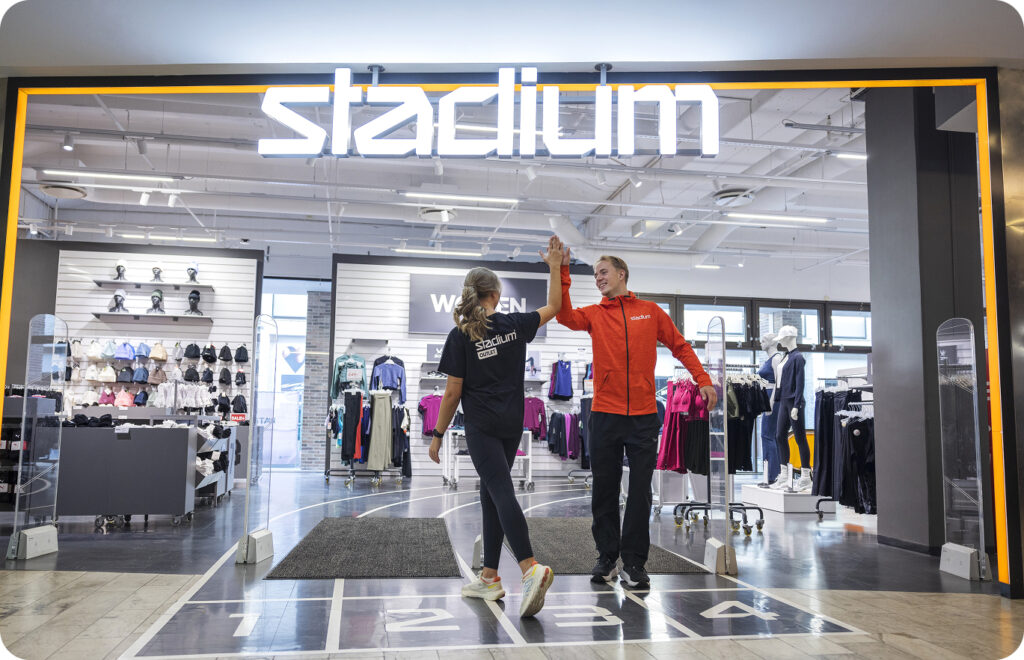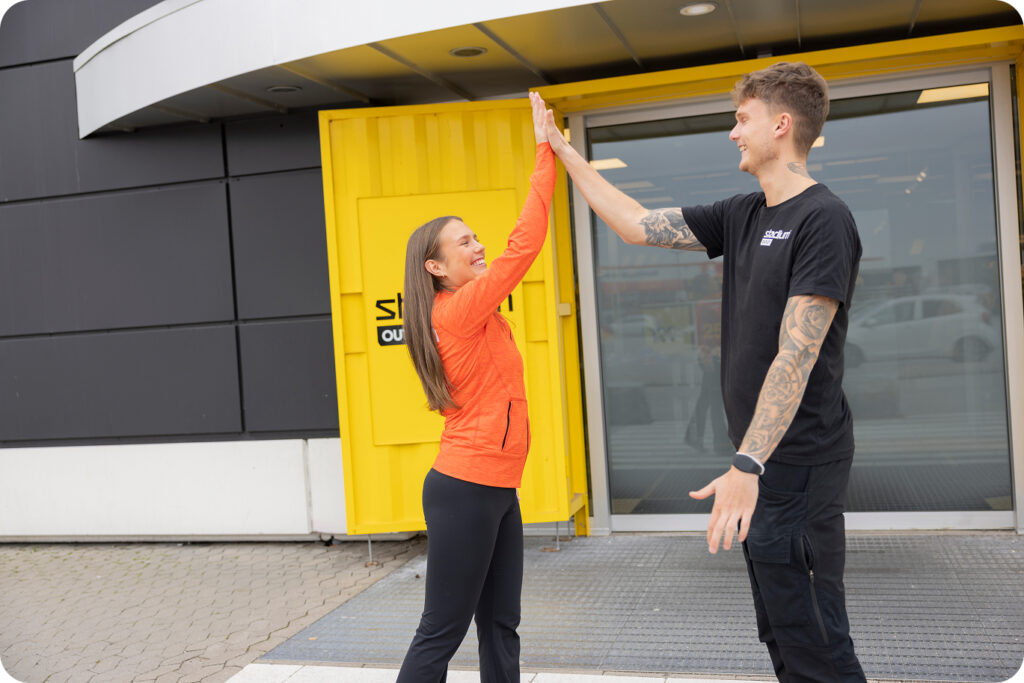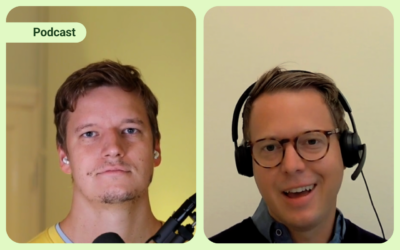How do you create a workplace where people want to stay, grow, and contribute? At Stadium, building a culture rooted in transparency, trust, and continuous dialogue is key. By using pulse surveys, they can consistently capture employee experiences and turn insights into meaningful improvements. Here, operational managers Åsa Steen and Markus Enebrink share how Stadium’s leadership and commitment to its employees have created a work environment that is not only enjoyable but also drives results.
For over 30 years, Stadium has grown from a family business into one of the Nordic region’s leading players in sports and leisure products. With 200 stores in Sweden, Norway, and Finland, the expansion has been a success story, but it’s not just growth that reflects the company’s strength. The strong interest in working at Stadium in stores and headquarters shows it’s a workplace with a company culture beyond the ordinary.
Åsa, operational manager for Stadium Sweden, and Markus, the operational manager for Stadium Outlet, have for several years led the organisation forward with a strong focus on employee engagement and development. By working closely with their teams and prioritising open communication, they have helped create a culture where transparency and participation run throughout the organisation.
Leadership with trust
For Åsa and Markus, leadership is about being present, clear, and daring to let go.
“We trust our employees and their expertise. If we want to grow and develop, we must also give them the mandate to make their own decisions,” Markus says.
Creating a workplace where everyone feels safe enough to contribute is crucial for success. This is especially true in an organisation that operates in three countries and where teams consist of both new talents and experienced employees – a dynamic that requires inclusive and responsive leadership.
Would you like to know Stadium’s 3 secrets to engaged teams?
Download our one-pager and get inspired!




Three countries – one common direction
Operating in multiple countries comes with challenges, but pulse surveys have helped Stadium identify common drivers and strengthen collaboration across borders. By having a unified structure for collecting and analysing feedback, teams in Sweden, Norway, and Finland can more easily share experiences and solutions with one another.
“We realise that we are more alike than we might think. The same questions in all countries allow us to act strategically and create a unified culture,” Markus says.
At the same time, the results allow for local adaptation. Some issues carry more weight in specific countries, and with pulse surveys, Stadium can identify these needs and adjust its efforts accordingly.
“It’s not just about understanding our differences but also highlighting our similarities. When we gather feedback from multiple countries, we see that certain issues weigh more heavily in different markets. This enables us to tailor our actions without losing the common direction, but most importantly, it helps us strengthen cohesion across borders,” Markus says.
How Stadium uses CatalystOne Engage
At Stadium, a total of 3,600 managers and employees work. Stadium has been using CatalystOne Engage since early 2023 and conducts four surveys per year, each with 10 recurring questions. This consistency allows them to compare results and track trends over time.
Three areas measured:
- Psychological safety: “In our team, I feel safe expressing my thoughts and opinions.”
- Appreciation: “I feel seen and appreciated when I do a good job.”
- Balance: “I feel I have a good work-life balance (e.g., sufficient time, the right conditions, and the ability to combine work with personal life).”
Generation Z is changing the game
More than half of Stadium’s store employees belong to Generation Z – a generation that values participation and a workplace where their contributions make a difference. They often expect clear and open communication, and for them, having an influence over their work environment is crucial, Åsa says.
“For them, having a voice and making an impact is an expectation. At the same time, we need to help them understand that feedback also comes with the responsibility to contribute to solutions,” she says.
Regular surveys have become an important tool for meeting the needs of this generation and play a key role in creating an inclusive and engaging work environment for all employees, regardless of generation or employment level.
“The person working 10% today might be working 100% tomorrow. That’s why everyone must feel that their voice matters,” Markus says.

How pulse surveys make a difference in everyday work
One key insight Stadium has gained over the years is the importance of keeping employee surveys focused and manageable. Previously, surveys were extensive, with numerous questions and large amounts of data to process. This made it difficult to see what needed improvement and created a significant administrative burden for managers.
“It became such a big process that it was hard to drive results, especially in stores where we had challenges. Now, with fewer questions and a more focused approach, we can work more strategically and achieve faster impact,” Markus says.
By keeping surveys short and recurring, Stadium can now capture important trends while ensuring that results are manageable and actionable.
“We want to ask questions frequently, but it shouldn’t take too much time. Regular, short, and sharp questions ensure a high response rate,” Åsa says.
Stadium’s quarterly pulse surveys are an integral part of daily operations. Through brief and regular surveys, each team gets a clear picture of what works – and what can be improved.
“It’s the team’s responsibility to develop. The manager can support, but the group drives the change,” Åsa says.
Sales associate Jenny in Malmö agrees.
“It’s easy to respond, and we get the results immediately. The best part is that we actually see our feedback leading to changes. That makes us feel involved and motivated to keep working together,” she says.
From words to action
Listening is one thing, but working with the results and turning feedback into real change is what makes the difference. When store managers indicated that the workload was too high, Stadium addressed the issues immediately. The result? A new store organisation with more leadership roles.
“This is entirely based on what employees tell us. The comments in the pulse surveys are just as important as the numbers, they show us the way forward,” Markus says.
By acting quickly on insights, Stadium ensures that changes truly create a better work environment and increase team engagement.
Never having to guess about organisational well-being
Stadium has an unusually high eNPS for a company of its size, averaging +65 over time, which is a clear indicator that its investment in transparency and employee engagement is paying off.
At Stadium, pulse surveys have become an essential tool for strengthening both teams and the business. By constantly listening and taking action, they are building a workplace where people want to stay and grow.
“Four times a year, we get a clear picture of how we are doing as an employer. That means we never have to guess, and we can keep improving,” Åsa concludes.


